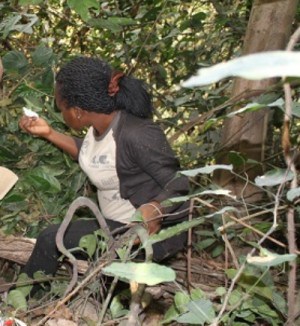
The notion that I was to camp in the forest close to a week made me sick when I went through the ERuDeF Institute of Biodiversity and Non-profit studies (EIBiNS) field calendar and discovered that I was to embark on a one week field trip on the insitu Conservation of wild life in the Tofala Hill Wildlife Sanctuary.
This fear was however overcome by my love for adventure, passion for wild life conservation and words of encouragement I got from my supervisor, Ms Asoh Bedwin, who is also the Research Coordinator at EIBiNS. She oriented me on biomonitoring trip preparation as we travelled from Buea, through Dschang and Lewoh to Besali, an adjacent community to Tofala. This prepared me psychologically that I was able to content the bumpy road
From Besali, one German Ph.D. research student at EIBiNS, Mr. Sebastian Linarz, an ERuDeF Biomonitor, Solomon, Madam Bedwin and I headed for the based camp in Tofala Hill Wildlife Sanctuary. We hiked to the forest; climbing and descending steep hills, escarpments and crossing streams for close to two hours before we arrived the based camp.
At the based camp, I was faced with another challenge; mounting of tents where we will spend the rest of our nights! With the help of Sebastian and Bedwin I learned and was able to also help in mounting the tents, something I have never experienced; not even during my undergraduate studies.
While at the camp, Madam Asoh, enlightened me on the collection of wildlife data during biomonitoring, variables to consider and the use of the GPS amongst others. We headed for the forest for the biomonitoring proper recording wildlife data including feeding signs of different wildlife species, nests, dung and many others. This was really interesting as I did not only see but actively participated in the collection of the different variables, something I have never been chanced to do practically. This gave me an understanding of wildlife ecology, threats and many others. I was also able to distinguish between a gorilla nest and a chimpanzee nest.
We did this continuously then this fateful day; we were in our traditional quiet fashion tracking wildlife when all of a sudden, we started encountering fresh Chimpanzee nests, dung, and different feeding signs. We went closer and when I lifted up my head, I saw a troop of chimpanzees on a tree feeding on fruits. I was very thrilled as we watched with excitement these “human cousins” skipping from branch to branch feeding on fruits and vocalizing. I realized that the sounds produced by the Champanzees were varied and the tempo depicted their age groups.
As we continued in to the forest, we heard another troop of Chimpanzee vocalizing from a distance for the others to give way. We walked towards the direction of the coming troop as the vocalization intensified to also see them but they got our footsteps and ran away. This was such an amazing experience that will never escape my memory.
In fact, I realized that wild life conservation is more effective in the field as you learn things that you will never understand just sitting in class. You have the opportunity to observe and ask questions to specialists in the domain; see, torch, smell and even taste the paraphernalia involved in the conservation of wild life. For instance, I saw and also learned how to set a camera trap on the trail of gorillas equally seen with my own eyes human threats like new farms created in the forest, sneer trap set by hunters and many others.
I want to heartily thank the EIBiNS administration for organizing such a trip and will be very glad to embark on many of such trips in the future in order to widen my scope and knowledge in wild life conservation/share my experience with the outside world.
Angwa Gwendoline
Wildlife Conservation Trainee at ERuDeF Institute



